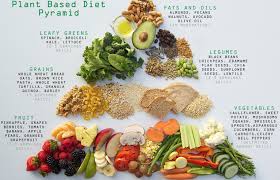As the new year unfolds, many individuals are seeking ways to enhance their health and well-being. Embracing a plant-based diet is increasingly recognized as one of the most effective strategies for achieving a healthier lifestyle. Plant-based meal plans offer a wealth of benefits, including improved nutrition, enhanced energy levels, and a reduced environmental footprint. This comprehensive guide will explore the essentials of plant-based eating, provide practical meal planning tips, and offer delicious recipes to help you start 2024 on the right foot.
Understanding Plant-Based Eating

What is a Plant-Based Diet?
A plant-based diet focuses on consuming foods derived primarily from plants. This includes fruits, vegetables, nuts, seeds, legumes, and whole grains. While it may seem similar to veganism, a plant-based diet does not necessarily exclude all animal products entirely but emphasizes plant-derived foods for the majority of meals.
Benefits of a Plant-Based Diet
- Nutritional Advantages: Plant-based diets are rich in essential nutrients such as vitamins, minerals, fiber, and antioxidants. These nutrients contribute to overall health, support immune function, and reduce the risk of chronic diseases.
- Weight Management: Studies have shown that plant-based diets can aid in weight management and obesity prevention. The high fiber content helps keep you full longer and supports healthy digestion.
- Heart Health: Plant-based eating is associated with lower cholesterol levels, reduced blood pressure, and a decreased risk of heart disease. The emphasis on fruits, vegetables, and whole grains contributes to cardiovascular well-being.
- Environmental Impact: Choosing plant-based foods can significantly reduce your carbon footprint and environmental impact. Plant-based diets typically require fewer resources and produce less greenhouse gas emissions compared to animal-based diets.
Creating a Plant-Based Meal Plan
1. Assess Your Nutritional Needs
Before starting a plant-based meal plan, it’s essential to assess your nutritional needs. Ensure you’re getting a balanced intake of protein, healthy fats, vitamins, and minerals. Key nutrients to pay attention to include vitamin B12, iron, calcium, omega-3 fatty acids, and zinc.
2. Plan Your Meals
Effective meal planning involves preparing a variety of dishes that are both nutritious and enjoyable. Here’s a sample meal plan to get you started:
Breakfast:
- Smoothie Bowl: Blend spinach, banana, frozen berries, and almond milk. Top with chia seeds, granola, and fresh fruit.
- Overnight Oats: Combine oats, almond milk, chia seeds, and a touch of maple syrup. Refrigerate overnight and top with nuts and berries.
Lunch:
- Quinoa Salad: Mix cooked quinoa with black beans, corn, cherry tomatoes, avocado, and a lime-cilantro dressing.
- Veggie Wrap: Fill a whole-grain wrap with hummus, mixed greens, shredded carrots, cucumber slices, and bell peppers.
Dinner:
- Lentil Stew: Cook lentils with tomatoes, carrots, celery, garlic, and spices for a hearty and comforting meal.
- Stuffed Bell Peppers: Fill bell peppers with a mixture of brown rice, black beans, corn, and diced tomatoes, then bake until tender.
Snacks:
- Fruit and Nut Mix: Combine almonds, walnuts, dried apricots, and apple slices for a satisfying and nutritious snack.
- Veggie Sticks with Hummus: Enjoy carrot and celery sticks dipped in a flavorful hummus.
3. Focus on Variety
Incorporate a wide range of plant-based foods into your diet to ensure you receive all the necessary nutrients. Experiment with different grains, legumes, and vegetables to keep your meals exciting and nutrient-dense.
4. Prepare and Store
Batch cooking and meal prepping can save time and make sticking to your plant-based meal plan easier. Cook larger quantities of grains, beans, and roasted vegetables, then store them in airtight containers for quick and convenient meals throughout the week.
Delicious Plant-Based Recipes for 2024

1. Sweet Potato and Black Bean Tacos
Ingredients:
- 2 large sweet potatoes, peeled and cubed
- 1 can black beans, drained and rinsed
- 1 tablespoon olive oil
- 1 teaspoon cumin
- 1 teaspoon paprika
- 1 teaspoon garlic powder
- Corn tortillas
- Fresh cilantro and lime wedges for garnish
Instructions:
- Preheat the oven to 400°F (200°C).
- Toss sweet potato cubes with olive oil, cumin, paprika, and garlic powder. Roast in the oven for 25-30 minutes until tender.
- Warm the corn tortillas and fill with roasted sweet potatoes, black beans, and fresh cilantro.
- Serve with lime wedges for a burst of freshness.
2. Creamy Avocado Pasta
Ingredients:
- 2 ripe avocados
- 2 cloves garlic
- 1/4 cup fresh basil leaves
- Juice of 1 lemon
- 1/4 cup olive oil
- Salt and pepper to taste
- Cooked whole-grain pasta
Instructions:
- In a food processor, blend avocados, garlic, basil, lemon juice, and olive oil until smooth.
- Season with salt and pepper to taste.
- Toss the creamy avocado sauce with cooked pasta and serve immediately.
3. Chickpea and Spinach Curry
Ingredients:
- 1 can chickpeas, drained and rinsed
- 2 cups fresh spinach
- 1 can coconut milk
- 1 onion, chopped
- 2 cloves garlic, minced
- 1 tablespoon curry powder
- 1 teaspoon turmeric
- 1 tablespoon olive oil
Instructions:
- In a large pan, heat olive oil and sauté onion and garlic until translucent.
- Add curry powder and turmeric, stirring for 1 minute.
- Pour in coconut milk, chickpeas, and spinach. Simmer for 10 minutes until the spinach is wilted and the flavors are well combined.
- Serve with brown rice or whole-grain naan.
Tips for a Successful Transition
- Start Slowly: If you’re new to plant-based eating, consider starting with a few meals per week and gradually increasing as you become more comfortable.
- Explore New Ingredients: Discover new plant-based foods and recipes to keep your meals interesting and varied.
- Listen to Your Body: Pay attention to how your body responds to a plant-based diet and make adjustments as needed to meet your nutritional needs.
- Seek Support: Join online communities or local groups to share experiences, recipes, and tips with others who are also embracing plant-based eating.
Conclusion
Embracing a plant-based diet in 2024 offers numerous benefits for your health, the environment, and your overall well-being. By planning your meals thoughtfully, incorporating a variety of nutritious foods, and exploring delicious plant-based recipes, you can embark on a journey towards a healthier lifestyle. Start your plant-based journey today and experience the positive impact it can have on your life and the world around you.




